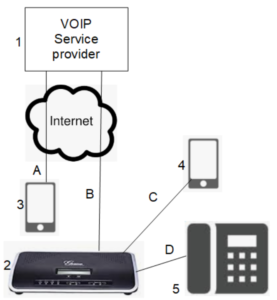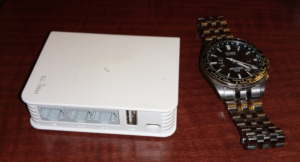 Canada has joined the Madrid Protocol. The Protocol will enter into force for Canada on June 17, 2019. Continue reading “Canada joins Madrid Protocol”
Canada has joined the Madrid Protocol. The Protocol will enter into force for Canada on June 17, 2019. Continue reading “Canada joins Madrid Protocol”
Securing your telephone calls
 At the time of the Cold War, if you wanted to have an extremely secure communication over an insecure communications channel, the only choice was to have somehow arranged an earlier secure communication over a secure channel. The iconic image of a diplomatic courier handcuffed to a briefcase was no mere icon. For many years at the height of the Cold War, the State Department distributed special phonograph disks to US embassies around the world containing the audio equivalent of the “one-time pads” that were used for secure encryption of character-based messages. The briefcase containing the phonograph disk counted as the “earlier secure communication over a secure channel” that permitted a later secure communication over an insecure channel such as an international telephone call or a radio communication. You can read about this program, called SIGSALY, in this Wikipedia article. By now in 2019 you can have telephone calls that are nearly as secure as the SIGSALY communications, and there is no need for any “earlier secure communication over a secure channel”. And the equipment that you will use is inexpensive when compared with the prodigiously expensive SIGSALY equipment. Continue reading “Securing your telephone calls”
At the time of the Cold War, if you wanted to have an extremely secure communication over an insecure communications channel, the only choice was to have somehow arranged an earlier secure communication over a secure channel. The iconic image of a diplomatic courier handcuffed to a briefcase was no mere icon. For many years at the height of the Cold War, the State Department distributed special phonograph disks to US embassies around the world containing the audio equivalent of the “one-time pads” that were used for secure encryption of character-based messages. The briefcase containing the phonograph disk counted as the “earlier secure communication over a secure channel” that permitted a later secure communication over an insecure channel such as an international telephone call or a radio communication. You can read about this program, called SIGSALY, in this Wikipedia article. By now in 2019 you can have telephone calls that are nearly as secure as the SIGSALY communications, and there is no need for any “earlier secure communication over a secure channel”. And the equipment that you will use is inexpensive when compared with the prodigiously expensive SIGSALY equipment. Continue reading “Securing your telephone calls”
Encrypting your telephone trunks

This blog article is nominally an “office tech” article talking about how to encrypt your telephone traffic. But it’s also a legal ethics article. I suggest that the attorney’s ethical duty to preserve client confidences calls for the attorney to be continually aware of the confidentiality risks for various types of communications, and for the ways to protect those communications. Today’s article talks about protecting your SIP telephone trunks, and it talks about how our firm’s favorite VOIP service provider has just now enhanced our options for protecting our SIP trunks. Continue reading “Encrypting your telephone trunks”
RO/EP joins the DAS system
 This has indeed been a busy week for good news about Offices participating in the DAS system. Yet another piece of good news is that RO/EP has joined the DAS system. Continue reading “RO/EP joins the DAS system”
This has indeed been a busy week for good news about Offices participating in the DAS system. Yet another piece of good news is that RO/EP has joined the DAS system. Continue reading “RO/EP joins the DAS system”
Canadian Intellectual Property Office joins DAS for designs
 I am delighted to see that the Canadian Intellectual Property Office (CIPO) has joined the DAS system for industrial designs. Continue reading “Canadian Intellectual Property Office joins DAS for designs”
I am delighted to see that the Canadian Intellectual Property Office (CIPO) has joined the DAS system for industrial designs. Continue reading “Canadian Intellectual Property Office joins DAS for designs”
Georgia patent office joins the DAS system
 This is a busy week for good news about participation in the DAS system. The Georgia patent office, whose formal name in English is the National Intellectual Property Center of Georgia, has joined the DAS system. Continue reading “Georgia patent office joins the DAS system”
This is a busy week for good news about participation in the DAS system. The Georgia patent office, whose formal name in English is the National Intellectual Property Center of Georgia, has joined the DAS system. Continue reading “Georgia patent office joins the DAS system”
Israel Patent Office joins the DAS system
 I am delighted to have learned that the Israel Patent office has joined the DAS system. Continue reading “Israel Patent Office joins the DAS system”
I am delighted to have learned that the Israel Patent office has joined the DAS system. Continue reading “Israel Patent Office joins the DAS system”
Broken links in “get your numbers in for the toteboards”
Hello readers. After comments from several people I went to look closely at my four recent posts:
- Get your numbers in for the 2018 US plant patent toteboard
- Get your numbers in for the 2018 US design patent toteboard
- Get your numbers in for the 2018 US utility patent toteboard
- Get your numbers in for the 2018 US trademark registration toteboard
Each blog article contains four important links for you to click on:
- a link to the questionnaire where you can enter your numbers for the particular category in that particular blog post, and
- crosslinks to the other three blog posts.
In each case the questionnaire link works fine so far as I am aware. But until today, each place where there was a crosslink to one of the other three blog posts, the crosslink was no good. It asked for a user ID and password instead of taking you to the desired page.
Thanks to alert readers, I have hopefully corrected the crosslinks.
Hopefully everybody will get their numbers in soon.
How long it takes these days to get a design patent filing receipt
How long is it taking these days for the Office of Patent Application Processing to mail out a Filing Receipt in a design case? I looked through some of our recently filed cases and here is what I found. Continue reading “How long it takes these days to get a design patent filing receipt”
My favorite travel router these days

My favorite travel router these days is the GL-AR750 (pictured at right). I used to go through travel routers at the rate of several per year, but this one has kept me happy for more than a year now. In this blog post I will list the functions that you might look for in a travel router and I will describe how this router does at those functions. Continue reading “My favorite travel router these days”
